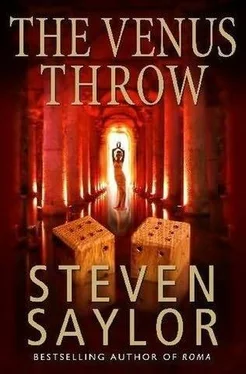Steven Saylor - The Venus Throw
Здесь есть возможность читать онлайн «Steven Saylor - The Venus Throw» весь текст электронной книги совершенно бесплатно (целиком полную версию без сокращений). В некоторых случаях можно слушать аудио, скачать через торрент в формате fb2 и присутствует краткое содержание. Жанр: Исторический детектив, на английском языке. Описание произведения, (предисловие) а так же отзывы посетителей доступны на портале библиотеки ЛибКат.
- Название:The Venus Throw
- Автор:
- Жанр:
- Год:неизвестен
- ISBN:нет данных
- Рейтинг книги:3 / 5. Голосов: 1
-
Избранное:Добавить в избранное
- Отзывы:
-
Ваша оценка:
- 60
- 1
- 2
- 3
- 4
- 5
The Venus Throw: краткое содержание, описание и аннотация
Предлагаем к чтению аннотацию, описание, краткое содержание или предисловие (зависит от того, что написал сам автор книги «The Venus Throw»). Если вы не нашли необходимую информацию о книге — напишите в комментариях, мы постараемся отыскать её.
The Venus Throw — читать онлайн бесплатно полную книгу (весь текст) целиком
Ниже представлен текст книги, разбитый по страницам. Система сохранения места последней прочитанной страницы, позволяет с удобством читать онлайн бесплатно книгу «The Venus Throw», без необходимости каждый раз заново искать на чём Вы остановились. Поставьте закладку, и сможете в любой момент перейти на страницу, на которой закончили чтение.
Интервал:
Закладка:
Whatever happens next, it will not involve me, and for that I am glad.
Rereading that letter now, I see that my statements regarding the circumstances of Dio's death are marred by a number of errors, some of them quite significant. But no statement was more in error than the final one, which I read now with a shudder of amazement. How could I have been so blithely, smugly unforeseeing? What a perilous world we move through, like men blindfolded. The past and future are equally obscure, and broad daylight can hide as many dangers as the landscape of the night.
PART TWO
Chapter Eight
Almost a month passed before I had occasion to write to Meto again.
To my beloved son Meto, serving under the command of Gaius Julius Caesar in Gaul, from his loving father in Rome, may Fortune be with you.
I write this letter on the twenty-ninth dayof Martius, an uncommonly warm day for so early in the spring-we have thrown open all the windows and the after-noon sunshine is hot on my shoulders. I wish you were here beside me.
Alas, you are not. Nor are you safely at ease in Illyria, where I last saw you. I learned in the Forum of your sudden move to Gaul not long after my visit. They say that Caesar was called to put down a revolt by some tribe with an un-pronounceable name-I won't even try to spell it. I presume that you have gone along with him.
Take care, Meto.
Given your movements, I have no way of knowing if my letter of a month ago has reached you, or will reach you after this one, or will ever reach you at all, but since one of Caesar's message bearers (a young soldier who has carried my letters to you before) is about to leave for Gaul and says he will take along a letter from me if I can finish it within the hour, I am writing very quickly and will simply give you what news I can, even at the risk of conveying events that make little sense for lack of context. (Don't show this letter to your commander, please. I fear that a man who dictates his memoirs on horseback would hardly accept being rushed as an excuse for fashioning such awkward sentences.)
Hopefully, you did receive my last letter, and so you know of the murder of Dio. I scoffed at those who said Dio's murder was too big a thing to go without consequence and that the scandal would result in someone being punished, but it seems that I was wrong and they were right, up to a point.
The scandal has been enormous. Dio was even better known and more highly regarded than I had realized-or did murder make a martyr of him and render him larger and more beloved in death than he was in life? For a man who is now spoken of in such tones of awe, he was certainly treated very shabbily in the final months of his life, shuffling from one reluctant (perhaps treacherous) host to another, expending his resources until his purse was empty. The senators who now speak of Dio as a second Aristotle and weep at the mention of his name are the same men who refused to allow Dio to speak in their chambers not long ago.
(I've suddenly remembered that old conundrum, which Dio posed to me as a young man in Alexandria: Is it better to be beloved in life and despised after death, or despised in life and revered after death?)
So the debate in the Senate over the Egyptian situation grinds on, freshly fueled by this shameful outrage. Meanwhile a charge of murder was recently brought against one Publius Asicius.
I must say that I was not surprised to see Asicius accused of Dio's murder. Dio himself suspected this young man of being involved in the failed poisoning attempt at the house of Lucius Lucceius, and told me as much when he visited me. On the very day that Dio's food taster died of poison, Asicius had paid a visit to Lucceius. By itself, this is a merely circumstantial connection. But then, after Dio left my house, and probably not long after he was stabbed in his bed, I happened to encounter Asicius and our neighbor M.C. in the street, and while I overheard them say nothing directly incriminating, the circumstances, at least in retrospect, struck me as highly suspicious.
So when I heard that the charge had been brought against
Asicius, I felt greatly relieved, thinking that if he was guilty, then perhaps the whole ugly truth would be given a chance to come out-and without having to become involved myself. (I imagine you sometimes feel the same relief in your work for Caesar, when an odious task is unexpectedly accomplished without any effort on your part, as if some friendly god had decided to do you a favor.)
But the gods can be fickle with their favors. Who do you think stepped forward to defend Asicius? Yes, the best defense advocate in Rome, our old friend Marcus Cicero.
When I heard that news, my hope abruptly dwindled. Many things may happen in a trial where Cicero is one of the advocates, but the emergence of the truth is seldom one of them. If justice triumphs, it happens in spite of Cicero's smoke and mirrors, and will have nothing to do with whether or not the truth was spoken.
They say that Cicero and Asicius were both away from Rome, down the coast, when Asicius was arraigned-Cicero in Neapolis, Asicius across the bay at his family's villa in Baiae. To discuss the case, Asicius went to fetch Cicero and took him back to Baiae in his magnificent litter. Well, not his, exactly, but a litter lent to Asicius by-can you believe it? — King Ptolemy.
(The complicity is absolutely damning! You would think that a man accused of murdering King Ptolemy's enemy would hide his connections with the king rather than flaunt them, but like most men of his generation, Asicius can't seem to resist any opportunity to show off.)
The litter was an enormous eight-man affair, elaborately decorated (Egyptian litters make the most elegant Roman conveyances look plain) and attended by no fewer than a hundred armed bodyguards, also lent to Asicius by King Ptolemy. (If the king supplied the bodyguards for Asicius's physical defense, who can help but conclude that it was also the king who hired Cicero for Asicius's legal defense?) Can you see it in your mind-Cicero and Asicius discussing the upcoming murder trial while they proceed along the shore borne aloft in a litter, lolling about in Egyptian luxury with a hundred swordsmen in their train?
I missed the trial; a relapse of the cough which plagued me in Illyria kept me from venturing down to the Forum.
Bethesda went to watch, but you can imagine the sort of report she came back with-I was informed that Asicius is quite good-looking, if a bit wasted and pale (Bethesda has heard that he drinks to excess); that Asicius's friend, our handsome young neighbor M.C., was nowhere in sight; and that Cicero was as long-winded and boring as ever.
And oh, yes, that Asicius was acquitted of murdering Dio.
I now regret having missed the trial, for I should like to have heard with my own ears the evidence presented. But I do not regret having missed whatever devious conjurer's tricks Cicero used to distract, disorient and ultimately persuade the judges. I don't need the aggravation.
So, for better or worse, the matter has come to a conclusion. Poor Dio shall go unavenged, but his legacy may yet prevail-
I lifted my stylus from the parchment, distracted by a knock. I turned in my chair and saw Belbo in the doorway.
"The messenger's come back, Master. He says he must have your letter now if he's to take it for you."
I grunted. "Show him in. No need to make him wait in the hallway." I returned to the letter.
I must close abruptly. Caesar's message bearer has re-turned.
I have foolishly spent this precious hour recounting Forum gossip and left myself no time to speak of family matters. Know that all is well. Bethesda is as always, and Diana becomes more like her mother every day (more beautiful, more mysterious). Eco continues to prosper, though I often wish I could have taught him a less dangerous trade than his father's, and his beloved Menenia has proved herself a woman of surpassing patience, especially in bringing up the uncontrollable twins. Imagine having two four-year-olds squabbling and stubbing their toes and catching colds…
Читать дальшеИнтервал:
Закладка:
Похожие книги на «The Venus Throw»
Представляем Вашему вниманию похожие книги на «The Venus Throw» списком для выбора. Мы отобрали схожую по названию и смыслу литературу в надежде предоставить читателям больше вариантов отыскать новые, интересные, ещё непрочитанные произведения.
Обсуждение, отзывы о книге «The Venus Throw» и просто собственные мнения читателей. Оставьте ваши комментарии, напишите, что Вы думаете о произведении, его смысле или главных героях. Укажите что конкретно понравилось, а что нет, и почему Вы так считаете.










